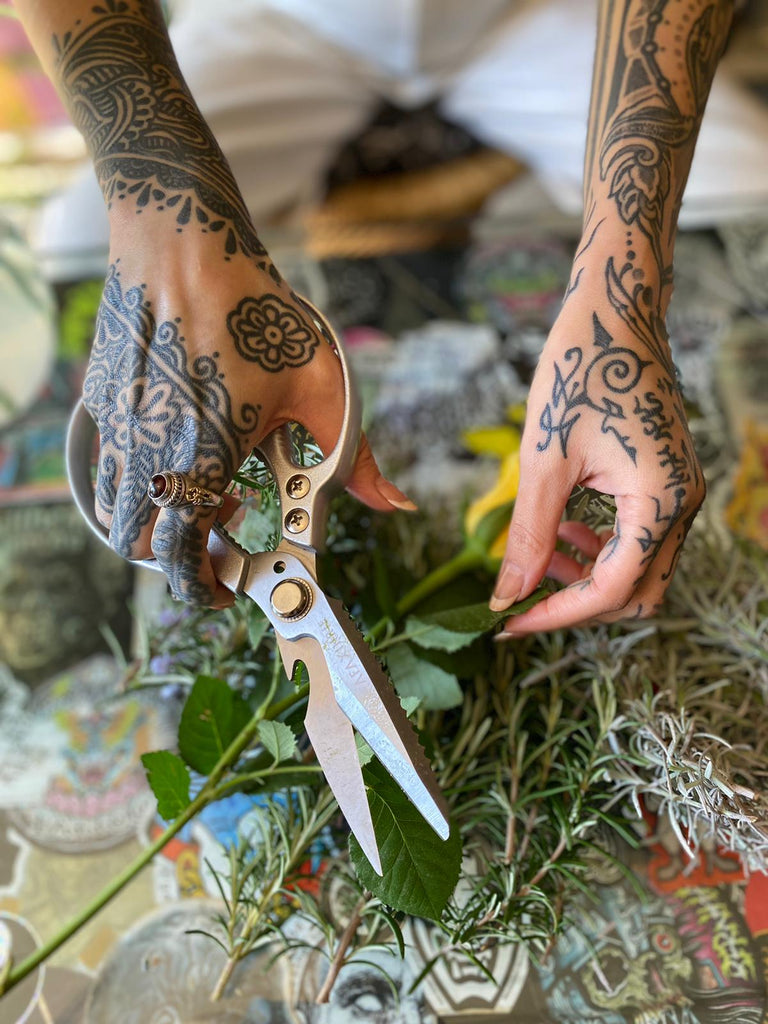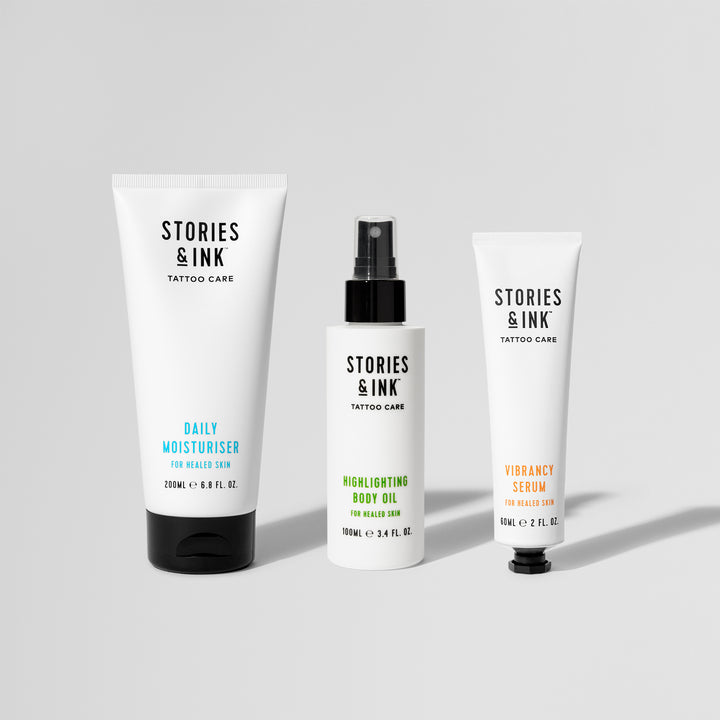Rachel Okna, a London-born writer, discusses the transformative power of tarot, how she turned her passion into a career, and her favourite tattoo experience to date.
"My first [tarot] reading changed my life," Rachel says. "I cried pretty much for the whole thing, bless the lady that read for me that day! It was a catalyst for so much change in my life."
"On the same day, I broke up with a partner of two years, got a tattoo on a whim, and started writing more than I had done so in years and years. In tarot speak, we’d call that a Tower moment."
From that first reading, Rachel has gone on to study tarot and now works from her home studio in East London as well as offering readings at a handful of tattoo conventions around the world every year.
We caught up which Rachel to find out more about this ancient practice.
What is tarot reading?
Good question! I get asked this often.
I could go back to ancient Egyptian times, where rumour has it that a symbolic set of cards was used to form a union with the divine… The Mediaeval courthouses and households in Europe where they were used to predict the truth and in some cases, a family game… Or, the modern day, where you can go on Youtube and have someone tell you that your ex really wants you back.
Then there's my way, which is heavily influenced by some iconic tarot readers like Mary K Greer, Rachel Pollack and Jessica Dore, even Aleister Crowley... which is a way of blending mythology, storytelling, and psychology to lure the visual imagination into facilitating and progressing conversations in the realms of growth, change, transformation and stuckness.

Why did you decide to learn to read tarot cards?
I bought my first deck of tarot cards and a book that has been called The Bible of Tarot, from Rachel Pollack, in 2016, shortly after getting my first reading. I was sceptical before the reading if I’m honest. I grew up with a Filipino Catholic mother and a devout atheist father, and in a sense, have always tried to figure out how to balance faith, spirituality, scientific data and realism.
But, the reading ended up being an experience that shifted the course of my life pretty much immediately. I felt seen for the first time in a while. So, my study and I guess apprenticeship started there.
How did you learn?
In a weird way, I think my whole life has kind of been an apprenticeship to what I do now. But there are some key moments…
In 2012 I completed a history degree at the University of Greenwich, studying the history of witches, gothic literature, and genocide, in my final year. It grooved me into using my hands to dig beneath rich sources in subjects from alchemy, sociology, and magic to psychology and philosophy.

After three years of working at Penguin Publishing, an imprint that published titles in the realms of science, poetry, and the literary classics, I trained to become a mental health first aid officer for my team. At the time I was also a carer for a family member whose mental health was deteriorating.
Equipping myself with the practical tools and information provided a valuable key, unlocking doors to hopes beyond that narrative. I listened to other people’s stories fortifying my knowledge and deepening my understanding of a mixture of mental health issues from creative resistance, work stress, eating disorders, anxiety, depression, and trauma.
In the early spring of 2018, after a breakup that left big wounds, I was a red silky guts bag of regret. I became a hermit for a while as I let the sugars of the situation dissolve and soften the bones. This was when my tarot studies really intensified.

I made a silent vow to become an active listener. So began my path to do my best to honour the sacred art of storytelling as a way to connection, restoration, and learning.
I expanded my tarot practice from reading just for myself and began to read tarot regularly for friends, and people I met through work and beyond soon after. I’ve been fortunate enough to meet and learn from a couple of experienced tarot mentors, whose work I admire and connect with.
I’ve read at a bunch of festivals and art events including Jondix's Crypt exhibition, Camp VC, and tattoo flash days at 1770 and Seven Doors, gathering with a profusion of different lives, questions, and stories along the ride.

In 2020 I began volunteering as an active listener for a helpline a couple of nights a week. The training, mentorship, and people that I listen to have been a source of unexpected joy and humbling insights. As well as reinforcing my skills to hold a safe, supportive space for others.
All of that, plus my daily journaling practice, weekly personal readings and ongoing self-study is how I learned really. I also write an offering every month and publish it on my substack, which will always go through one or several cards in some respect.
What's been the most significant thing you've gained from tarot reading?
If I had to zoom in on one thing, it would be the impact it has had on my confidence in the pursuit of my career and creative ambitions. I started a newsletter and podcast called Inner Demons: The Stories We Tell Ourselves over two years ago, which is an exploration of areas I am fascinated by; symbolism, philosophy, mythology, literature, art and studying behavioural patterns.

It revivified my writing and that has changed my life irrevocably. I speak with people from all over the world, all different backgrounds about my writing, and whilst I still have a modest readership, connecting with people who engage with my writing has been and remains to be my main aspiration in life.
Do you have any noteworthy or memorable readings that you can recall?
As I am committed to being respectful of all of my client's privacy, I never talk specifically about a particular person’s reading. However, truthfully, all my readings teach me different things, about the cards, human nature, desire, faith and so much more.
What advice would you give to someone interested in having a tarot reading?
To be as open, honest and curious as you feel comfortable being. Readings are collaborative - so you don’t have to have a passive experience. Above anything, for me, the cards are visual tools to facilitate and stimulate conversations. You have the power to say what you really think and feel, and I highly encourage it, what you get out of it will be enhanced tenfold by doing so.
What other elements are important to you when tarot reading?
A couple of years ago, in a conversation with a psychologist, we talked about the practical power of reinvigorating the senses during emotionally intense moments. So, things like smell, taste, touch and hearing. So, I always have some type of meditation music playing softly in the background, a scented candle with my favourite or the client's favourite scents.
I’m dedicated to creating a space that is comforting and evocative. I will nine times out of ten ask the querent to shuffle the cards a bit too so that they too feel fully a part of the process. I have rosemary and lavender bushes in my garden, so I always burn them and wrap the cards in smoke before almost every reading. It’s a ritual that brings me into focus.

I know that smoke is used in Native American ceremonies and Asian mourning rituals to usher in a period of change. To this day my mother still lights a candle and places it at her makeshift shrine just outside the kitchen area in my childhood home.
She also leaves a bit of food next to the urns and pictures of the family she has lost. She does this to remember, respect and I guess admit her grief. So, maybe fire and smoke have filtered down to me through her rituals based on connection and respect.
Why do people find clarity from readings?
Every tarot reader and every person getting a reading has a different way and reason/objective for reading. I mentioned earlier that different cultures used them for various reasons. I feel that over the last five to ten years, people are pushing back against living life purely in accordance with scientific reasoning.

Like films and other art forms, tarot can articulate knowledge embedded in inarticulate knowledge. Whether you’re into tarot or astrology, it almost doesn’t matter because I feel that those practices contribute to part of a language that we are all crafting and carving out in real-time, to expand the conversations and perceptions in the fields of psychology, spirituality and mental health.
I think it was psychologist Carl Jung that said we think in images and translate that into words. So, I believe a core reason people can find clarity in readings is that they in a sense have a chance to do their own vision board with the cards. Allowing them to make contact with their true self more clearly and fully. This can give their actions, wishes and experiences purpose and meaning. And we all need that to feel alive.
Do you have any tattoos related to tarot reading?
As the tarot is at large, about pursuing the meaning, psychology and personal significance of symbols in our lives, if I take it in that sense, my whole body is full of symbolic images.
I got a ghost rider tattoo on my thigh to commemorate and honour a relationship in my life, as an example, so to build a story around images, is in a nutshell what tarot is. It is something we do all the time, whether we are aware of it or not.

What is it you love about tattoo culture?
Without a doubt, the friendships I have made.
What's been your favourite tattoo experience and why?
Around five years ago, after a breakup that left big wounds, I was searching for an image that would offer me some grace, some compassion, that could, and I know this will sound too much, but save me.
At my lowest point in life, I for some reason decided to get a tattoo of the Hindu Goddess of death, transformation and rebirth - Kali. A year and a half later, the guy that tattooed me would become my partner. And since then, I have become a full-time writer and tarot reader.
And, I have travelled the world working at tattoo conventions and making lifelong friendships. One decision changed my life in ways I could not have ever imagined. I owe Tattoo everything for that.
Follow Rachel Okna on Instagram @racheloknatarot.

